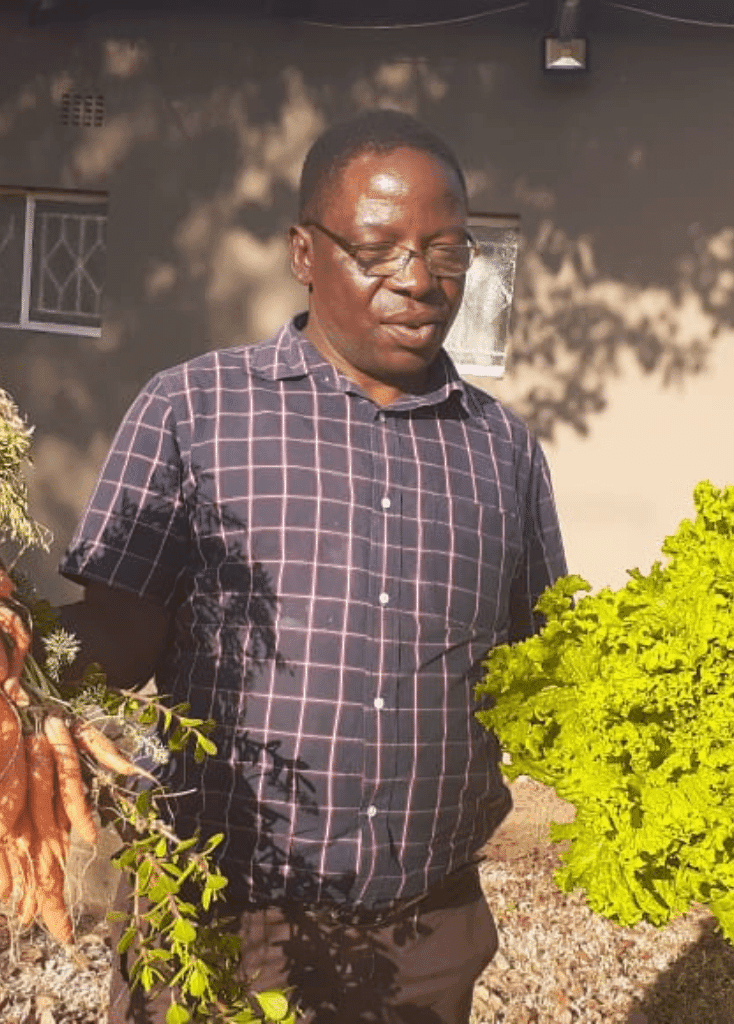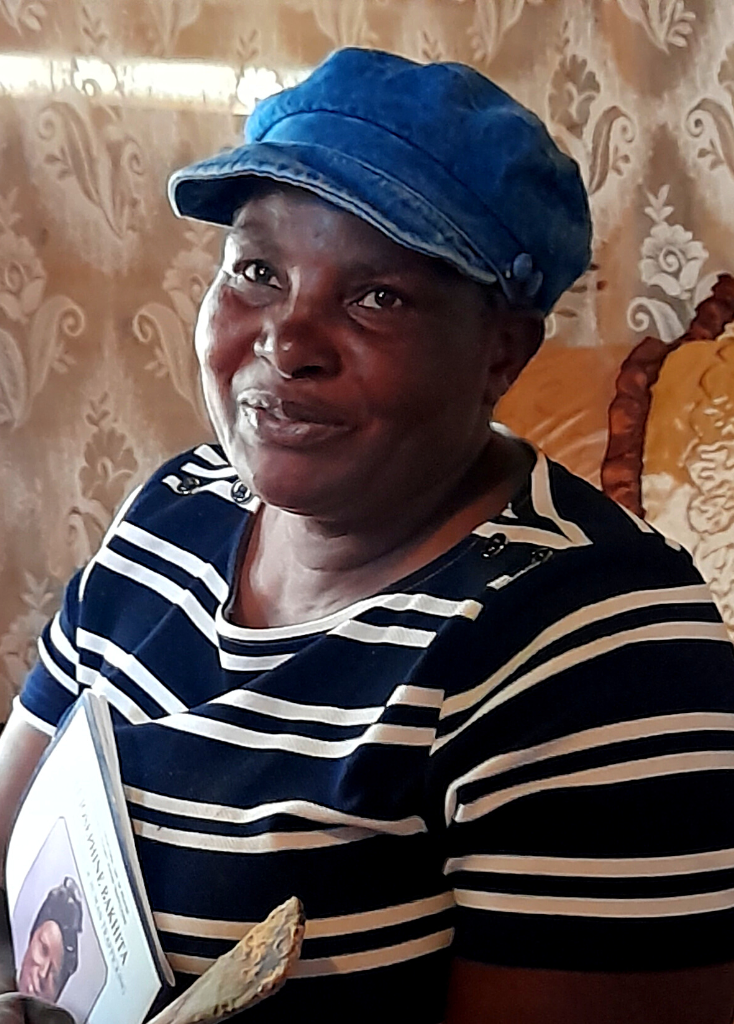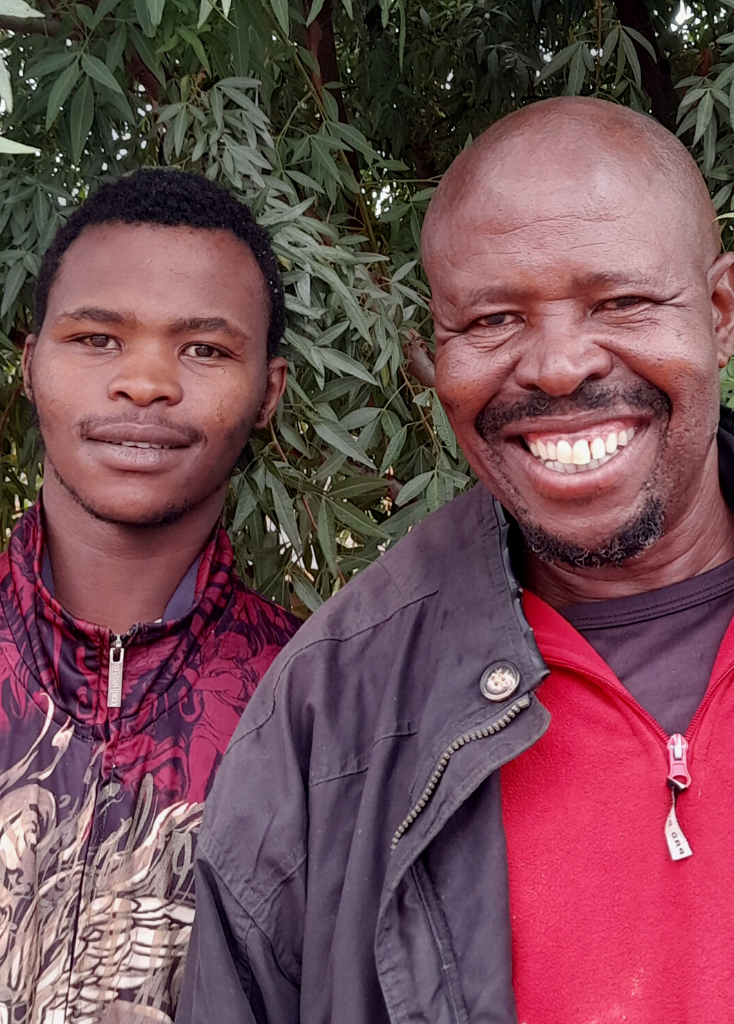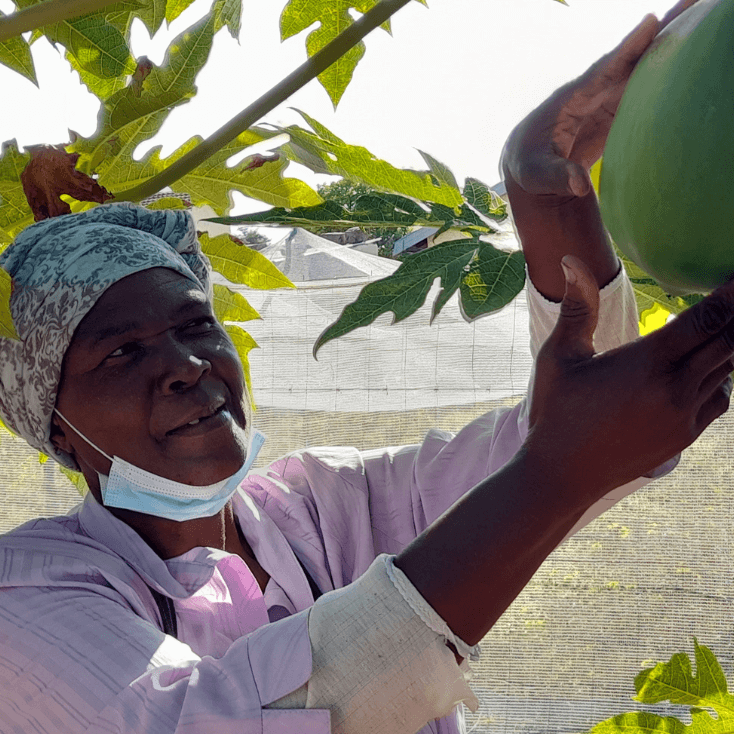
SOCIOTECH BBL FACILITATOR: Kwena Chipi
Kwena says…
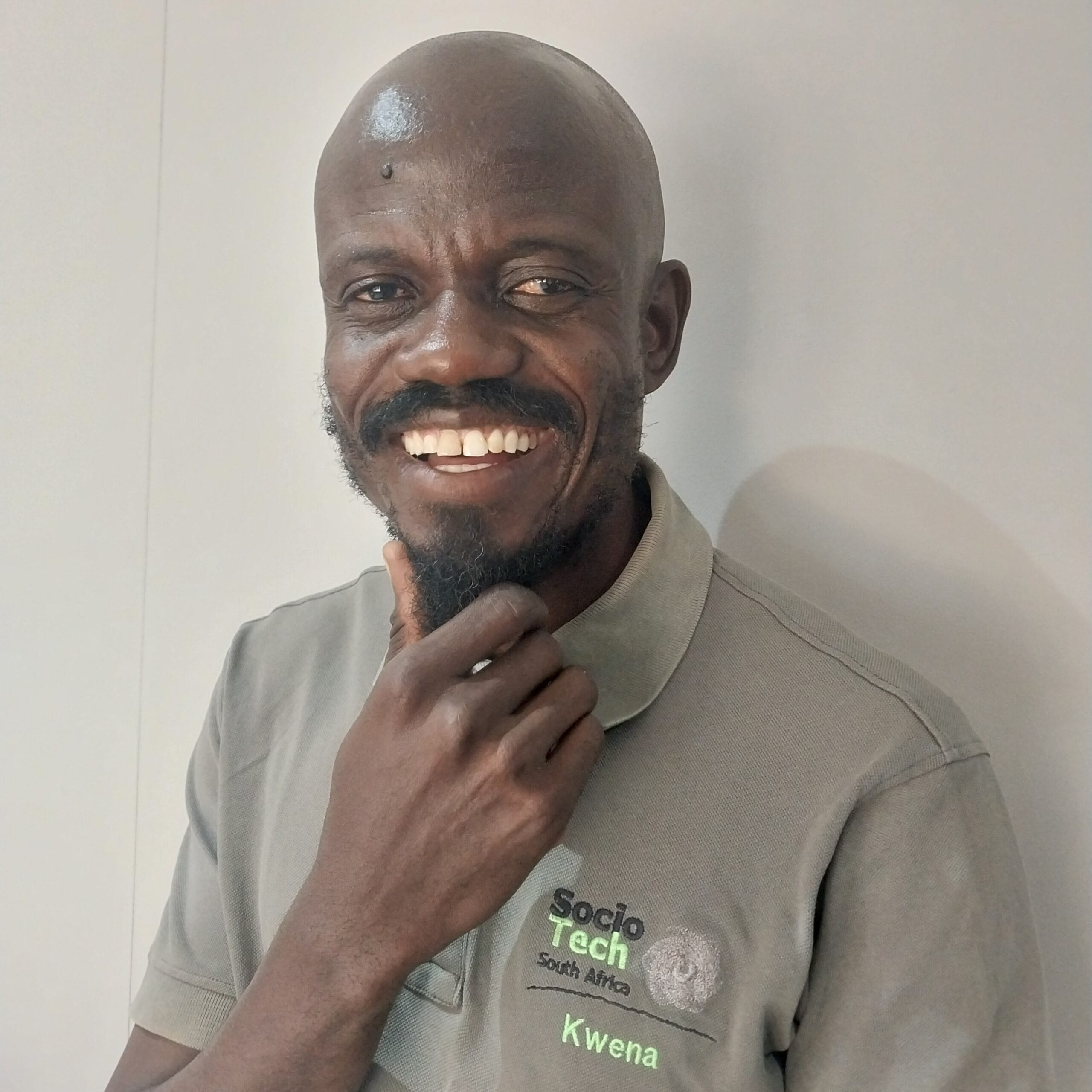
My journey with SocioTech’s BBL is filled with God’s grace. In 2018, I was a pastor at Hope for Africa Church in Dennilton, and I was finding it painful ministering to hungry people. It was very clear to me that those in need cannot eat ‘God bless you’. Words alone will not put bread on the table. Fortunately, Baba Cletus (Damba) and I belonged to the same church, and he introduced me to the concepts behind the BBL MyFood training. I could see that it offered true, sustainable freedom from poverty, because it was providing ordinary people with the power to provide for themselves. When Baba Damba asked if he could host a MyFood training session at my house, I saw right away that this could be a game changer for impoverished households in our community. I knew it was the solution that I had been praying for.
I did the MyFood training along with the rest of my congregation. Even though I had been farming since childhood, I still learnt a lot. Trenching, seasonal planting, and crop rotation were all new to me. I could see that these methods would work in my area. I liked that participants, myself included, could start small and almost immediately see results. I felt sure that this training could ignite a flame of hope in a community that was often hopeless.
After I had completed the classes myself, I immediately started mobilising others. The Phinda-Phinda system (whereby each person trains at least three others) was in my heart. Baba Cletus and another facilitator called KG told us that each participant should train at least three other people using Phinda-Phinda, but I didn’t stop there. I just kept going. Training and training and training. At first, I recruited people for training by going house to house. Then I went to places where I knew crowds gather, such as taxi ranks, bus stops, and schools. Baba Cletus started asking me to come with him to assist with training sessions in my district. By October 2019 I had trained so many people with such passion, that I was asked to formally join SocioTech.
Because I began as a participant, everything I teach is something that I have experienced – whether that be farming techniques, record keeping methods, or the concepts behind profitable selling – I teach it because I learnt it, implemented it, and saw it succeed in my own life. And I teach it to my children. Many children only learn about money when they get to university and then we wonder why they do silly things. It is because they have never been taught how to manage money. I teach my children how to save, and how to make money grow. My wife knows that business is not a hobby. Business is business because of profit, and that must always be remembered when selling. Money is a tool. Like a spade. If you have a spade but it sits in your garage, it is not fulfilling its purpose. That spade must be used correctly to bring benefit. In the same way money must be used wisely. If it is not growing, it is going down. I am a changed man because of SocioTech. We are a changed family. When I tell participants about my journey, I see myself in them, and they see themselves in me.
I used to be full of doubt and my mindset held me back. I used to wait for opportunities, not knowing where they would come from. Now I know that I can make my own opportunities. I can just start where I am with what I have. I tell others that it is all about realizing your own power and the power of your location. Look around you. The things you need to start are right there. That is such a game-changing way of seeing the world. For me, that is the start of all other change. When participants understand their power, that is when they start to succeed. I say to participants: ‘who must believe in you if you don’t believe in you? Believe in you, learn so that you can improve yourself. Implement by starting small but have a 5-year plan – you must believe that the future is yours to shape.’
It is not straight forward. People can get dispirited and lose sight of their goals, which is why our stable presence in participants’ lives is important. At SocioTech we don’t do hit and run. We are there for the long term. We are there from the start when there is nothing, through the expansion and selling phases. We celebrate when there are success stories, but we share challenges too. I always tell our participants that farming has seasons and that there will be successes and failures along the way. We learn and grow together. Our WhatsApp group system means that if there is a challenge, we put it on the group and share our knowledge to solve the problem. Someone will have a solution. Together and through God, solutions are found.
I am inspired and humbled by the participants every day. Everyone has their own journey, but when I am training, I often tell participants the story of Phindile Kgophane from Moteti, Liberty. She is a model that we can all learn from. Her journey has not been easy, but she has a very special determination and discipline that makes her powerful. She has created an abundant food garden – actually a farming business. Her confidence has grown, and her business is flourishing. She is ploughing her profits into building a beautiful home. She has saved money for a borehole. She is always willing to learn new things. She always wants to achieve more and is always willing to share what she knows to motivate others. She is a natural community leader, and everyone who comes into contact with her is inspired. She shows us what is possible if you believe in God and you believe in yourself. When you pour that confidence into hard work, results come.
As I watch the BBL magic working amongst the communities, I see that this method is there as a gift from God. In Mark 11: 2 we are told that the disciples enter a village, untie the donkey and bring it to Jesus so that he can ride into Jerusalem. I feel that our people are like that tied up ass. SocioTech facilitators are like the disciples sent to untie them, so that they can fulfill God’s purpose. We release those who are tied up by poverty. We untie them with information and hope.
My journey with SocioTech’s BBL is filled with God’s grace. In 2018, I was a pastor at Hope for Africa Church in Dennilton, and I was finding it painful ministering to hungry people. It was very clear to me that those in need cannot eat ‘God bless you’. Words alone will not put bread on the table. Fortunately, Baba Cletus (Damba) and I belonged to the same church, and he introduced me to the concepts behind the BBL MyFood training. I could see that it offered true, sustainable freedom from poverty, because it was providing ordinary people with the power to provide for themselves. When Baba Damba asked if he could host a MyFood training session at my house, I saw right away that this could be a game changer for impoverished households in our community. I knew it was the solution that I had been praying for.
I did the MyFood training along with the rest of my congregation. Even though I had been farming since childhood, I still learnt a lot. Trenching, seasonal planting, and crop rotation were all new to me. I could see that these methods would work in my area. I liked that participants, myself included, could start small and almost immediately see results. I felt sure that this training could ignite a flame of hope in a community that was often hopeless.
After I had completed the classes myself, I immediately started mobilising others. The Phinda-Phinda system (whereby each person trains at least three others) was in my heart. Baba Cletus and another facilitator called KG told us that each participant should train at least three other people using Phinda-Phinda, but I didn’t stop there. I just kept going. Training and training and training. At first, I recruited people for training by going house to house. Then I went to places where I knew crowds gather, such as taxi ranks, bus stops, and schools. Baba Cletus started asking me to come with him to assist with training sessions in my district. By October 2019 I had trained so many people with such passion, that I was asked to formally join SocioTech.
Because I began as a participant, everything I teach is something that I have experienced – whether that be farming techniques, record keeping methods, or the concepts behind profitable selling – I teach it because I learnt it, implemented it, and saw it succeed in my own life. And I teach it to my children. Many children only learn about money when they get to university and then we wonder why they do silly things. It is because they have never been taught how to manage money. I teach my children how to save, and how to make money grow. My wife knows that business is not a hobby. Business is business because of profit, and that must always be remembered when selling. Money is a tool. Like a spade. If you have a spade but it sits in your garage, it is not fulfilling its purpose. That spade must be used correctly to bring benefit. In the same way money must be used wisely. If it is not growing, it is going down. I am a changed man because of SocioTech. We are a changed family. When I tell participants about my journey, I see myself in them, and they see themselves in me.
I used to be full of doubt and my mindset held me back. I used to wait for opportunities, not knowing where they would come from. Now I know that I can make my own opportunities. I can just start where I am with what I have. I tell others that it is all about realizing your own power and the power of your location. Look around you. The things you need to start are right there. That is such a game-changing way of seeing the world. For me, that is the start of all other change. When participants understand their power, that is when they start to succeed. I say to participants: ‘who must believe in you if you don’t believe in you? Believe in you, learn so that you can improve yourself. Implement by starting small but have a 5-year plan – you must believe that the future is yours to shape.’
It is not straight forward. People can get dispirited and lose sight of their goals, which is why our stable presence in participants’ lives is important. At SocioTech we don’t do hit and run. We are there for the long term. We are there from the start when there is nothing, through the expansion and selling phases. We celebrate when there are success stories, but we share challenges too. I always tell our participants that farming has seasons and that there will be successes and failures along the way. We learn and grow together. Our WhatsApp group system means that if there is a challenge, we put it on the group and share our knowledge to solve the problem. Someone will have a solution. Together and through God, solutions are found.
I am inspired and humbled by the participants every day. Everyone has their own journey, but when I am training, I often tell participants the story of Phindile Kgophane from Moteti, Liberty. She is a model that we can all learn from. Her journey has not been easy, but she has a very special determination and discipline that makes her powerful. She has created an abundant food garden – actually a farming business. Her confidence has grown, and her business is flourishing. She is ploughing her profits into building a beautiful home. She has saved money for a borehole. She is always willing to learn new things. She always wants to achieve more and is always willing to share what she knows to motivate others. She is a natural community leader, and everyone who comes into contact with her is inspired. She shows us what is possible if you believe in God and you believe in yourself. When you pour that confidence into hard work, results come.
As I watch the BBL magic working amongst the communities, I see that this method is there as a gift from God. In Mark 11: 2 we are told that the disciples enter a village, untie the donkey and bring it to Jesus so that he can ride into Jerusalem. I feel that our people are like that tied up ass. SocioTech facilitators are like the disciples sent to untie them, so that they can fulfill God’s purpose. We release those who are tied up by poverty. We untie them with information and hope.



